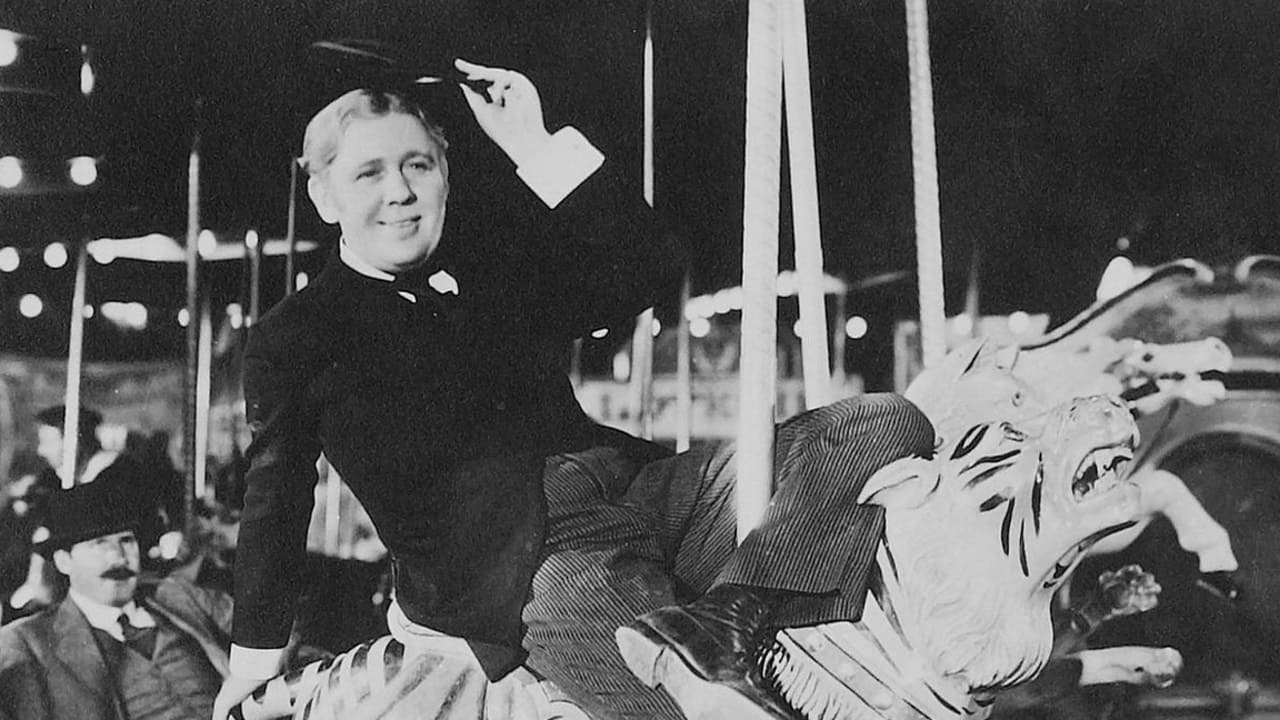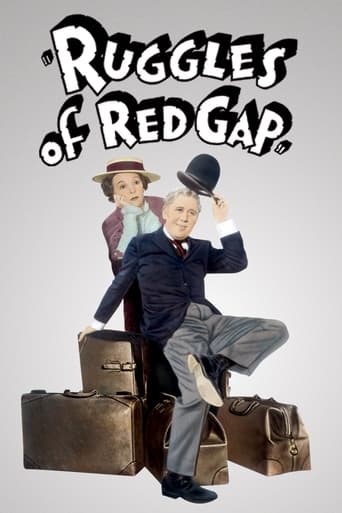

I'm probably petty, but I find it difficult to enjoy films that star actors or actresses I really think I would intensely dislike. A good example of this is Charles Laughton. He's creepy. BUT...every once in a while a film of his will play on TCM and I will be transfixed by his performances -- "This Land Is Mine" and "The Paradine Case" being two examples. Now I must add another -- "Ruggles Of Red Gap". What a gem of a film, and what a gem of a performance by Laughton.This is a particularly good film for 3 reasons. First, a top-notch story. Second, a top-notch cast. Third, because it has as its underlying purpose a kudo to American democracy and individual freedom.In regard to the story, it's more than it might appear at first glance. First there's two very different characters -- a British manservant and an American cowboy-type, who each have to adjust to each other. You might say Bob Hope did that in one of his films. Yes, but there it was one man adjusting. Here, both very different men are adjusting to each other and to different worlds. And then it settles down into will a Brit be accepted in the American West? In regard to the cast, as already mentioned, Charles Laughton is magnificent here, and a semi-comedy is so much different for him. This is also an excellent part for Charles Ruggles; we often see him as sort of a mix between an uncouth cowboy and a man of some standing...not the sort of natty character he often portrayed. Mary Boland as his uppity wife did well, although her character is annoying. It was a pleasure to see the offbeat ZaSu Pitts in a bigger role than unusual, and as a love interest! Roland Young as a Brit...well, I never understood the attraction to him as an actor...and I still don't.In regard to the patriotic aspect of this story, there was a time when unbridled patriotism was something to be proud of it. And here a "foreigner" finds acceptance simply because he is what he is, not because of who he is. He is fascinated with Lincoln's Gettysburg Address, and spellbinds the patrons of a saloon by reciting it. And after all is said and done, the Brit becomes a jolly good fellow to the semi-cowboys of the town.It's difficult to find much to criticize here. But a lot to like. Highly recommended.
... View MoreHarry Leon Wilson's 1915 novel about a British "gentleman's gentleman" adjusting to life in America's Wild West proved a popular subject for films. Edward Everett Horton played him in 1923 but, once again, Charles Laughton made the role his own in the definitive 1935 version. Laughton was ideally cast as Marmaduke Ruggles, the valet of scatterbrained Britisher George Vane Bassingwell (Roland Young), who is won in a poker game by George's nouveau-riche American cousin Egbert Fround (Charles Ruggles). This is just the most hilarious movie, Laughton's calm and very human characterization is in sharp contrast to his usual sinister and exotic roles.Fround and his wife, Effie (Mary Boland) are doing the "Grand Tour" and Effie hopes that Ruggles will use his influence to give Fround a touch of class (Fround wears check suits, plaid suits, refuses to have his "handle bar" moustache trimmed and prefers to frequent cafes and beer halls rather than museums and art galleries). But Fround starts to introduce Marmaduke as the Colonel and by the time they reach Red Gap - he is a celebrity!!! Before they leave Paris there is a brilliant scene where Fround and his friend proceed to get Ruggles drunk - Laughton is a scream, he instantly loses his stiff upper lip, screams "Yahoo", gets falling down drunk and even flirts with Effie!!! Once in Red Gap he meets the villain of the piece (Lucien Littlefield - you instantly know he's the villain as he quickly orders Ruggles to deal with the luggage)!!! But he also meets friends who don't care whether he's plain Ruggles or the Colonel but like him for who he is, especially Zasu Pitts as the widow Mrs. Judson, who helps him achieve his dream of opening an Anglo American restaurant. Ruggles has the distinction of introducing "scones" to the Wild West. There is such a fine roster of character actors - apart from all those mentioned there is the wonderful Maude Eburne as Egbert's mother, a cross between Annie Oakley and Calamity Jane ("don't call me Madam around here")!! But it is Laughton's very low key yet very laugh out loud portrayal of Ruggle's gradual emancipation from formal servant to master of his own destiny that dominates this absolutely brilliant film. It is also nice to see Leila Hyams in the small but telling role of the beautiful Nell Kenner, whose parties are where all the gentlemen of the town want to be!!!
... View MoreThis film begins with Roland Young losing his manservant, Ruggles (Charles Laughton), in a poker game! As a result, this fancified gentleman's gentleman is transported from Europe to a small hick town in the state of Washington (the desert Eastern portion). At first, this is a tough transition, as his new master (Charlie Ruggles) insists on familiarity and won't let Ruggles act like a typical servant. Instead, he takes Ruggles drinking with him and fills him full of ideas about equality. After a while, it's obvious that Ruggles is starting to enjoy this--allowing himself a few drinks, dancing and fun. And, in Red Gap, he's a very popular man--and soon becomes an indispensable part of the community.The film is a nice blend of comedy and sentimentality. It also is a bit deeper than you might first think, as it has a lot to say about democracy and the class system. I can easily see how this film helped to make Laughton a star, but it sure didn't hurt that he had such a great supporting cast and excellent direction (as always) by Leo McCarey--one of the truly great comedic directors who directed both Laurel and Hardy films as well as wonderful screwball comedies (such as THE AWFUL TRUTH). A wonderful and sweet little comedy.
... View MoreAmerican comedy was at its strongest in the 1930s and '40s. Ruggles of Red Gap is a great representative of that era. There hasn't been an American movie in the past two, maybe three decades that's as funny as this one. Ruggles of Red Gap begins with one of the funniest premises imaginable: a British butler, Marmaduke Ruggles (Charles Laughton), is won from his lord (Roland Young) in a poker game by a wily American (Charlie Ruggles) whose pretentious wife (Mary Boland, Ruggles' constant co-star) wants the butler to teach him some manners. The first half-hour is easily the strongest section in the film, with Ruggles (I'll be referring to the actors) the fish-out-of-water in Paris, trying to sidestep his conniving wife and teach Laughton, steeped in the servant tradition, to let himself go and have some fun. When the two men are supposed to be at the Louvre, Ruggles drags his new manservant to a sidewalk establishment and orders them some beers. A fellow resident of Red Gap (the town in Washington State where Ruggles and Boland live, and to where they will later take Laughton) sees Ruggles there and they cause a huge scene with their Wild West antics. They even get poor Laughton drunk, for perhaps the first time in his life, and he learns the most useful of American phrases: "Yippee!" He also learns how to smile. Boland is at her strongest in the first section, as well. Her attempts to speak French are hilarious. "Trays amazing!" she bungles. When the crew arrives in America, the film loses a bit of its steam, but not much. It has a great story, unlike many of the other great comedies being made at the time (which relied on caricatures like W.C. Fields and the Marx Brothers), and that keeps it entertaining. Laughton is such a delight to behold, and he meets up with a lovely woman played by the undervalued character actress Zasu Pitts, best remembered for her neurotic wife role in Erich von Stroheim's 1925 masterpiece Greed. I have only seen her in two non-Greed movies, counting Ruggles of Red Gap, but she's obviously a huge comic talent. Laughton may be the star, but Charlie Ruggles, also a semi-forgotten comic master, steals the movie from him. Boland is funniest when the film is in Paris, but she's still pretty good afterwards. Another scene stealer is Roland Young. I love his mumbling way of speaking. He comes back later in the movie and has a great scene where he learns to play the drums. Leo McCarey is one of comedy's finest directors in comedy's finest era. What a wonderful film this is! 9/10.
... View More